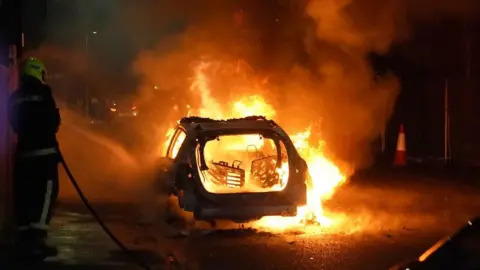Police forces across the country are to increase their co-operation to tackle violent disorder, Sir Keir Starmer announced on Thursday.
It comes after a crisis meeting with police chiefs following rioting in the wake of the Southport attack, which saw unrest spread across the country earlier this week.
Starmer described the chaotic scenes that unfolded in the aftermath of the stabbing as the “actions of a tiny, mindless minority” and condemned “far-right hatred”.
Earlier on Thursday, a 17-year-old appeared in court charged with the murder of three children in the attacks on Monday.
The prime minister said the new national violent disorder programme would help clamp down on violent groups by allowing forces to share intelligence.
In a televised speech, Sir Keir added: “These thugs are mobile, they move from community to community, and we must have a police response that can do the same.”
He also condemned “violent disorder, clearly whipped up online”, describing it as crime, “not protest”.
“We will take all necessary action to keep our streets safe”, the PM continued.
Sir Keir said nobody involved in rioting should “pretend they are speaking” for the grieving families, adding that the community of Southport “had to suffer twice” in the wake of the stabbings.
“Mosques being attacked because they’re mosques – the far right are showing who they are. We have to show who we are in response to that.”
 PA
PA“These thugs are mobile,” he added, “they move from community to community. We must have a policing response that can do the same.”
The new powers would include shared intelligence and the wider deployment of facial recognition technology.
It would also include more Criminal Behaviour Orders (CBO) to restrict the movement of offenders and stop them travelling, similar to measures taken against football hooligans.
Speaking to the BBC after a meeting with the prime minister, the chair of the National Police Chiefs Council has said further disorder can be avoided.
Chief Constable Gavin Stephens said: “It’s our job in policing to be worried about this but it’s not inevitable”. He also warned those thinking of attending further riots would feel the full force of the law.
The police chair also urged communities to pull together – and said everyone had to play a part “in not fanning any flames of disorder”.
Sir Andy Marsh, Chief Constable at the College of Policing, said in a statement that the emergency meeting which brought together police leaders from across England and Wales was “to make sure that we are talking to each other, and that we can be prepared.”
Some of the places targeted in the widespread disorder were mosques, leading the Muslim Council of Britain to urge mosques to strengthen security during Friday prayers.
In a message to British Muslims who expressed concerns, the prime minister said: “Let me be very clear: I will take every step that’s necessary to keep you safe.”
On Tuesday, Southport saw a night of unrest following a vigil in memory of the victims of the knife attack. Protesters gathered near a mosque in the Merseyside town and threw bricks at the building and police officers, leading to the arrest of five men.
Merseyside Police announced on Thursday that a Section 60 Order would be in place, granting officers additional powers to search suspects.
The order, starting at 18:00 BST, is set to be in place until 18:00 on Friday. The force also confirmed there would be an increased police presence.
On Wednesday evening, more than 100 people were arrested in central London as officers clashed with protestors in Whitehall during a demonstration.
Unrest also broke out in Hartlepool, where eight people were arrested, several officers were injured and a police car was set on fire. In Manchester, two people were arrested after objects were thrown at the public and police. In Aldershot, Hampshire, a police officer suffered minor injuries during trouble near a hotel housing migrants.
Dal Babu, former Ch Supt and firearms commander in the Metropolitan Police, blamed the disorder on the “reckless” spread of misinformation about the identity of the suspect charged in the stabbing.
The prime minister was asked what he would do to hold social media companies accountable for the spread of disinformation on their platforms.
He responded by saying discussions need to be had about companies striking the “right balance”, and warned social media “carries great responsibility”.






